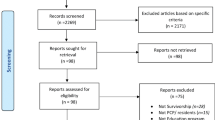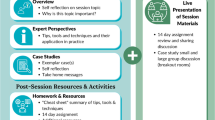Abstract
Purpose
To create a community of learning involving primary care providers and subspecialist to enhance providers’ knowledge regarding care of adult childhood cancer survivors (CCS).
Methods
A stepwise approach was used to develop educational opportunities for providers. This process started with a local/regional in-person conference, which informed a webinar series, and resulted in the development of enduring material using a dynamic learning management system.
Results
Participants in all three learning platforms had an increase in knowledge from baseline regarding care for adult CCS. Majority of participants at the in-person conference and webinar series were oncology or other specialty providers. The enduring dynamic learning management system successfully reached a variety of providers and other allied health providers across the country. There was a slightly higher rate of participation on this platform by primary care providers of 12.5%.
Conclusions
Care providers’ knowledge of survivorship needs of adult CCS can be increased by multiple forms of instruction. However, the dynamic learning management system was most successful at reaching a broad audience. Advertisement through local and national organizations was not as successful as anticipated. Additional strategies are needed to successfully engage providers, specifically primary care providers (PCPs).
Implications for Cancer Survivors
The professional development needs of primary care providers regarding care of adult CCS is well recognized. A dynamic learning management system may represent the most convenient and accessible way to provide education, but new strategies for increasing providers’ awareness and engagement are required. The goal of improving care of adult CCS requires increased providers knowledge.
Similar content being viewed by others
References
Noone AM HN, Kranch M, et al In: SEER Cancer Statistics Review, 1975–2015. 2015. https://seer.cancer.gov/archive/csr/1975_2015/. 2019.
Dixon SB, Bjornard KL, Alberts NM, Armstrong GT, Brinkman TM, Chemaitilly W, et al. Factors influencing risk-based care of the childhood cancer survivor in the 21st century. CA Cancer J Clin. 2018;68(2):133–52. https://doi.org/10.3322/caac.21445.
Hudson MM, Ness KK, Gurney JG, Mulrooney DA, Chemaitilly W, Krull KR, et al. Clinical ascertainment of health outcomes among adults treated for childhood cancer. JAMA. 2013;309(22):2371–81. https://doi.org/10.1001/jama.2013.6296.
Oeffinger KC, Nathan PC, Kremer LC. Challenges after curative treatment for childhood cancer and long-term follow up of survivors. Hematol Oncol Clin North Am. 2010;24(1):129–49. https://doi.org/10.1016/j.hoc.2009.11.013.
Phillips SM, Padgett LS, Leisenring WM, Stratton KK, Bishop K, Krull KR, et al. Survivors of childhood cancer in the United States: prevalence and burden of morbidity. Cancer Epidemiol Biomark Prev. 2015;24(4):653–63. https://doi.org/10.1158/1055-9965.EPI-14-1418.
Oeffinger KC, Mertens AC, Hudson MM, Gurney JG, Casillas J, Chen H, et al. Health care of young adult survivors of childhood cancer: a report from the Childhood Cancer Survivor Study. Ann Fam Med. 2004;2(1):61–70.
Henderson TO, Hlubocky FJ, Wroblewski KE, Diller L, Daugherty CK. Physician preferences and knowledge gaps regarding the care of childhood cancer survivors: a mailed survey of pediatric oncologists. J Clin Oncol. 2010;28(5):878–83. https://doi.org/10.1200/JCO.2009.25.6107.
Landier W, Bhatia S, Eshelman DA, Forte KJ, Sweeney T, Hester AL, et al. Development of risk-based guidelines for pediatric cancer survivors: the Children’s Oncology Group Long-Term Follow-Up Guidelines from the Children’s Oncology Group Late Effects Committee and Nursing Discipline. J Clin Oncol. 2004;22(24):4979–90. https://doi.org/10.1200/JCO.2004.11.032.
Friedman DL, Freyer DR, Levitt GA. Models of care for survivors of childhood cancer. Pediatr Blood Cancer. 2006;46(2):159–68. https://doi.org/10.1002/pbc.20611.
Warner EL, Montenegro RE, Stroup A, Kinney AY, Kirchhoff AC. Health care concerns of rural childhood cancer survivors. J Health Care Poor Underserved. 2014;25(2):901–12. https://doi.org/10.1353/hpu.2014.0095.
Shad A, Myers SN, Hennessy K. Late effects in cancer survivors: “the shared care model”. Curr Oncol Rep. 2012;14(2):182–90. https://doi.org/10.1007/s11912-012-0224-1.
Hutchinson RJ. Primary care for adult survivors of childhood cancer: medical needs and required strategies. Adolesc Med State Art Rev. 2013;24(3):643–58.
McClellan W, Klemp JR, Krebill H, Ryan R, Nelson EL, Panicker J, et al. Understanding the functional late effects and informational needs of adult survivors of childhood cancer. Oncol Nurs Forum. 2013;40(3):254–62. https://doi.org/10.1188/13.ONF.254-262.
Diller L, Chow EJ, Gurney JG, Hudson MM, Kadin-Lottick NS, Kawashima TI, et al. Chronic disease in the Childhood Cancer Survivor Study cohort: a review of published findings. J Clin Oncol. 2009;27(14):2339–55. https://doi.org/10.1200/JCO.2008.21.1953.
Oeffinger KC, Hudson MM, Landier W. Survivorship: childhood cancer survivors. Prim Care. 2009;36(4):743–80. https://doi.org/10.1016/j.pop.2009.07.007.
Zhou C, Crawford A, Serhal E, Kurdyak P, Sockalingam S. The impact of project ECHO on participant and patient outcomes: a systematic review. Acad Med. 2016;91(10):1439–61. https://doi.org/10.1097/ACM.0000000000001328.
Acknowledgments
A special thanks to the Kansas Area Health Education Center, specifically Mary Beth Warren and Michael Pommier, for providing CME and advertising, and the Cancer Survivorship Training, Inc. for the use of the eLearning platform. We would also like to thank all of the speakers for generously sharing their time and knowledge.
Funding
Grant funding was provided by the Masonic Cancer Alliance.
Author information
Authors and Affiliations
Corresponding author
Ethics declarations
Conflict of interest
Funding for “Bridging the Gap” was provided by the Masonic Cancer Alliance. Jennifer Klemp is the Founder/CEO of the Cancer Survivorship Training, Inc.
Additional information
Publisher’s note
Springer Nature remains neutral with regard to jurisdictional claims in published maps and institutional affiliations.
Electronic supplementary material
ESM 1
(DOCX 14.1 kb)
Rights and permissions
About this article
Cite this article
Fulbright, J.M., Hein, W., Stegenga, K. et al. Implementing a stepwise educational approach for bridging the gap between specialty and primary care for childhood cancer survivors. J Cancer Surviv 14, 660–665 (2020). https://doi.org/10.1007/s11764-020-00878-8
Received:
Accepted:
Published:
Issue Date:
DOI: https://doi.org/10.1007/s11764-020-00878-8




